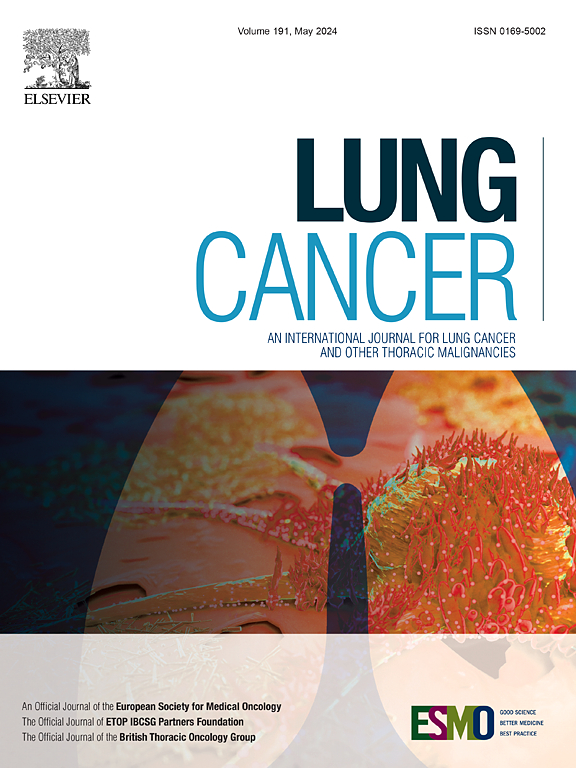Efficacy and safety of taxane versus gemcitabine for advanced stage lung squamous cell carcinoma in global EHR-based retrospective cohorts: A pairwise propensity score–matched comparison
IF 4.4
2区 医学
Q1 ONCOLOGY
引用次数: 0
Abstract
Background
Lung squamous cell carcinoma represents a significant global health challenge, with platinum-based chemotherapy regimens remaining a cornerstone of treatment. While both Taxanes and Gemcitabine are recommended as category 1 treatment options by the National Comprehensive Cancer Network (NCCN), their comparative effectiveness in real-world settings requires further investigation.
Methods
This retrospective cohort study utilized the TriNetX global collaborative network to analyze data between January 1, 1990, and October 31, 2024. Adults with stage IV lung squamous cell carcinoma were identified using ICD-10 code C34 and the TriNetX oncology disease classification system. Patients were categorized into Taxane and Gemcitabine groups. Propensity score matching was employed to minimize selection bias. Primary and secondary outcomes included overall survival, progression-free survival, and adverse events.
Results
A total of 992 patients were included, with 203 patients in each group after propensity score matching. The Taxane group demonstrated significantly improved overall survival compared to the Gemcitabine group (HR: 0.638, 95 % CI: 0.497-0.0821, p = 0.0004). Progression-free survival also showed statistically significant benefit over the Taxane group (HR: 0.686, 95 % CI: 0.532–0.885, p = 0.0035). Pairwise analysis revealed that Paclitaxel demonstrated superiority compared to both Docetaxel and Gemcitabine. The incidence of adverse events was comparable between groups.
Conclusions
Our findings demonstrate that Taxane, particularly Paclitaxel, offers superiority compared to Gemcitabine in patients with advanced lung squamous cell carcinoma, with comparable safety profile. These results support the prioritization of Taxane-based regimens in clinical practice. Future research should focus on combination strategies with immunotherapy to enhance treatment outcomes.
紫杉烷与吉西他滨在全球基于ehr的回顾性队列中治疗晚期肺鳞状细胞癌的有效性和安全性:两两倾向评分匹配比较
背景:肺鳞状细胞癌是一个重大的全球健康挑战,以铂为基础的化疗方案仍然是治疗的基石。虽然紫杉烷类和吉西他滨都被国家综合癌症网络(NCCN)推荐为1类治疗方案,但它们在现实环境中的相对有效性需要进一步研究。方法:本回顾性队列研究利用TriNetX全球协作网络分析1990年1月1日至2024年10月31日的数据。使用ICD-10代码C34和TriNetX肿瘤疾病分类系统对成人IV期肺鳞状细胞癌进行鉴定。患者分为紫杉烷组和吉西他滨组。采用倾向评分匹配最小化选择偏差。主要和次要结局包括总生存期、无进展生存期和不良事件。结果:共纳入992例患者,经倾向评分匹配后,每组203例。与吉西他滨组相比,紫杉烷组的总生存率显著提高(HR: 0.638, 95% CI: 0.497-0.0821, p = 0.0004)。与紫杉烷组相比,无进展生存期也有统计学意义上的显著改善(HR: 0.686, 95% CI: 0.532-0.885, p = 0.0035)。两两分析显示紫杉醇比多西他赛和吉西他滨都有优势。组间不良事件发生率具有可比性。结论:我们的研究结果表明,紫杉烷,特别是紫杉醇,在晚期肺鳞状细胞癌患者中与吉西他滨相比具有优势,并且具有相当的安全性。这些结果支持在临床实践中优先考虑紫杉烷为基础的方案。未来的研究应侧重于联合免疫治疗策略,以提高治疗效果。
本文章由计算机程序翻译,如有差异,请以英文原文为准。
求助全文
约1分钟内获得全文
求助全文
来源期刊

Lung Cancer
医学-呼吸系统
CiteScore
9.40
自引率
3.80%
发文量
407
审稿时长
25 days
期刊介绍:
Lung Cancer is an international publication covering the clinical, translational and basic science of malignancies of the lung and chest region.Original research articles, early reports, review articles, editorials and correspondence covering the prevention, epidemiology and etiology, basic biology, pathology, clinical assessment, surgery, chemotherapy, radiotherapy, combined treatment modalities, other treatment modalities and outcomes of lung cancer are welcome.
 求助内容:
求助内容: 应助结果提醒方式:
应助结果提醒方式:


